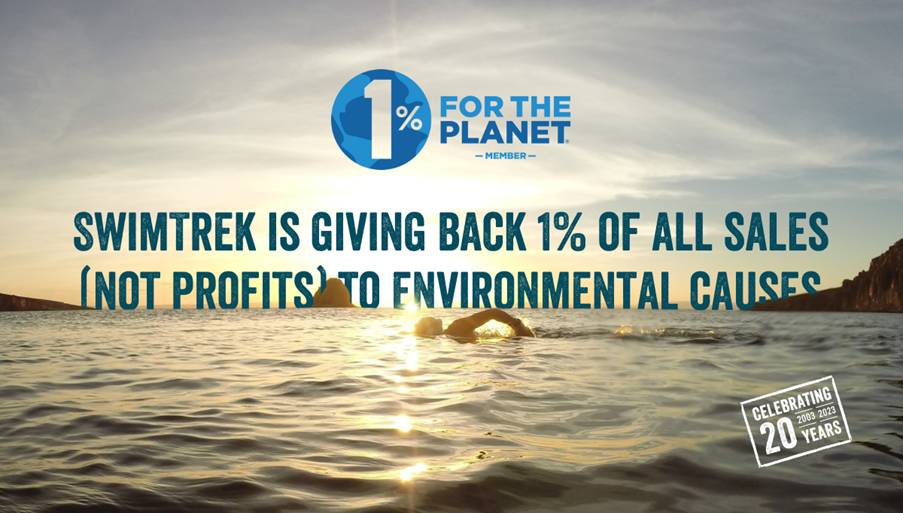Responsible Travel
At SwimTrek, we’re dedicated to creating unforgettable swimming experiences by harnessing our community to respect the worlds’ open water, aiming to minimize our ecological footprint by working with local communities and supporting local businesses. We aim to actively reduce our own environmental impact throughout our operations by conscientiously implementing sustainable practices and partnerships.

1% For The Planet
SwimTrek is giving back 1% of all sales (not profits) to environmental causes.
To make a change in the way we do business we want to illustrate our commitment to protecting the planet and putting our money where our mouth is.
We have partnered with 1% For The Planet to ensure that as our business continues to grow, we can attempt to serve to encourage a more positive environmental impact. 1% For The Planet membership is a commitment to accountability, partnership building and doing better for both people and the planet.
We’re proud to give 1% of our annual revenue back to environmental partners - those who are working on today’s most pressing climate issues. We want this statement to show that not just this earth day, but everyday we will support commitments to environmental initiatives that support conservation and regeneration.
Everything We Do Has An Impact
Our business is founded on the idea of possibility and the excitement that adventure and exploration brings. It is our responsibility to ensure that we go about this in a conscientious way. We do not have all the answers, but aim to continuously improve our global operations to be an active part of this movement.
Find out more below about how we plan to alter our operations, develop our global partnerships and support our stakeholders at every level, ensuring we continue to be a positive presence in both the communities and environments we value so much.
The United Nations World Tourism Organisation (UNWTO) defines sustainable tourism as: 'Tourism that takes full account of its current and future economic, social and environmental impacts, addressing the needs of visitors, the industry, the environment and host communities'
As environmental stewards we aim not only to experience the natural world but to return in kind for the experiences we are afforded from it.
Take a look at our Sustainability Initiatives to learn more.
How We Aim To Mitigate Our Impact

Environmental
We're committing to transitioning our operations through a natural capital approach. This is a long term commitment to tangible change, which will be broken down into short and long term goals.

Social
The past 20 years have seen our stakeholder engagement grow. Our staff, the communities that we visit and our partners, make the business what it is. We commit to a concerted effort to support our international teams to facilitate sustainable business practices.

Governance
Championing integrity through the appropriate adoption of core business governance structures and reporting, balancing profit with purpose, we commit to a global movement - reimagining the future of business.
Sustainable Development Goals
The only way that international travel can continue to exist is by every travel provider and every guest engaging in a global concern for the environment. We must recognize the awesome potential of the planet we inhabit, but just as importantly we must also appreciate our environmental limits. At SwimTrek we align our business development and strategic growth with the United Nations Sustainable Development Goals (SDG's).

8 - Decent Work and Economic Growth: Tourism, as services trade, is one of the top four export earners globally, currently providing one in ten jobs worldwide. Decent work opportunities in tourism, particularly for youth and women, and policies that favour better diversification through tourism value chains can enhance tourism positive socio-economic impacts.
11 - Sustainable Cities and Communities: Tourism can advance urban infrastructure and accessibility, promote regeneration and preserve cultural and natural heritage, assets on which tourism depends.
12 - Responsible Consumption and Production: The tourism sector needs to adopt sustainable consumption and production (SCP) modes, accelerating the shift towards sustainability. Tools to monitor sustainable development impacts for tourism including for energy, water, waste, biodiversity and job creation will result in enhanced economic, social and environmental outcomes.
13 - Climate Action: Tourism contributes to and is affected by climate change. Tourism stakeholders should play a leading role in the global response to climate change. By reducing its carbon footprint, in the transport and accommodation sector, tourism can benefit from low carbon growth and help tackle one of the most pressing challenges of our time.
14 - Life Below Water: Coastal and maritime tourism rely on healthy marine ecosystems. Tourism development must be a part of Integrated Coastal Zone Management in order to help conserve and preserve fragile marine ecosystems and serve as a vehicle to promote a blue economy, contributing to the sustainable use of marine resources.
15 - Life On Land: Rich biodiversity and natural heritage are often the main reasons why tourists visit a destination. Tourism can play a major role if sustainably managed in fragile zones, not only in conserving and preserving biodiversity, but also in generating revenue as an alternative livelihood to local communities.

Read more about the SDG's and discover how businesses and individuals can engage in a global movement toward sustainable change: https://tourism4sdgs.org/

